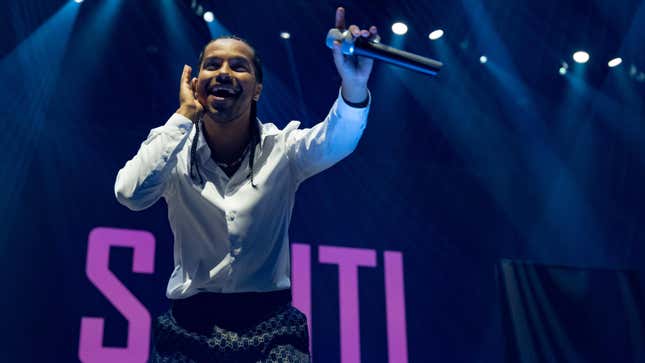
To understand the sheer chokehold that reggaeton has on culture right now, just look at Bad Bunny: The Puerto Rican rapper-singer’s meteoric rise includes multiple Grammy Awards, shattered records (he had the biggest streaming year of any artist in Spotify history in 2022—yes, more than Tay and Bey), a Kardashian-Jenner girlfriend, blockbuster action movies, the works. It’s exactly the kind of “King of Latin Trap” trajectory that aspiring Boricua performer Santi (Tyler Dean Flores) is after in Neon, a new eight-episode comedy that premieres October 19 on Netflix.
With one semi-viral song in his pocket (“Exagerao,” a clubby lover-boy crooner produced for the series by Grammy winner Tainy, who serves as an executive music producer) and not much else, the rising reggaetonero road-trips from small-town Florida to Miami, the Magic City, where hopefully that enchanted reputation will help him score a record deal and break big into the Latin music industry.
But he’s not alone: His two equally earnest childhood besties—Ness (Emma Ferreira), acting as Santi’s more practical-minded manager, and Felix, his high-flying creative director (played by Filipino multi-hyphenate Jordan Mendoza, who is also a consulting producer and writer on the show, which means he gets all the best lines)—are along for the ride with their own ambitions and naivety. Together, the spirited trio scrape together an existence in the big city, sleeping in their car when they can’t afford an apartment and fudging their way into meetings with record-label reps.
That is, in the first episode at least. As the season goes on, Santi & Co.’s adventures among the bright lights and big names of the 305 seem a bit too easy; less scrappy hustle and more sheer luck. “Where do you see yourself going from here? Please tell me it’s not that you moved here, were gonna take a couple meetings with some labels, and were just hoping that they’d climb all over each other hoping to sign you,” one such A&R rep, Mia (Insecure’s Courtney Taylor), asks the gang during an early sit-down. But despite a few—too few—setbacks involving cheesy supermarket commercials and lackluster club turnouts, that’s exactly how things go for the young creatives.
That solitary “Exagerao” track is apparently well-known enough to get Santi into the hottest industry parties and rubbing elbows with the right connections—including Jordana Brewster’s Gina, a mysterious Miami businesswoman—and soon the down-on-their-luck trio has traded backseat snoozing for beachfront property. In fact, out of the whole group, the only real hustle we see is from Mia, a woman of color shrewdly maneuvering her way through male-dominated rooms in her efforts to make Santi a shining star. (Similarly, Taylor is the only actor remotely imbuing her character with any sort of depth.)
Maybe it would all seem more plausible if Flores’ Santi was more convincing as just that, a star. “Santi is different,” Ness proclaims to a music journalist with whom she’s trying to sway favor. “And how is he different?” the writer retorts, and it’s a question that Neon as a whole has trouble answering. We are told time and again that the wannabe superstar has what it takes to dominate the charts and have his name in lights, but Flores simply doesn’t have the command or charisma to back up those claims.
The fact that Santi’s performances are very clearly dubbed—up-and-coming Dominican singer RMAND laid the vocals for the original tracks used in the show—also doesn’t help that argument. If there’s one thing we’ve learned from Glee, Daisy Jones & The Six, Empire, Nashville, and, hell, even The Idol, it’s that if you’re going to do a TV show about singers, you better be singing.
There’s also a flimsiness to the show’s portrayal of Miami itself, no doubt a byproduct of production taking place in Puerto Rico rather than the Floridian metropolis. No matter how many palm-tree stock shots, hyper-saturated colors and mentions of Art Basel and Moonlight get sprinkled throughout each episode, Neon can’t quite shake that eerie “Toronto in place of NYC” quality that plagues so many Netflix originals.
And despite frequent cameos by real-deal musical talent throughout, including Brray, Jowell, Jon Z, Jota Rosa, and the “King of Reggaeton” himself, Daddy Yankee—who also serves as an executive producer on the show, ensuring the soundtrack has bops for days—the series’ handling of its very own Latin-ness feels surface-level. One performer quips, “According to my team, I need to tap into my Latina identity. Or is it Latino? Latine, Latinx? I really don’t know what we’re supposed to say anymore,” and it seems the show doesn’t quite know either. The production team has faced criticism for not including Boricua voices in the writers’ room, and neither of the co-creators, Shea Serrano and Max Searle (who also acts as showrunner), are of Puerto Rican descent.
It’s a curious oversight, not only given its Puerto Rican protagonist but also the outsized influence that the small island has had on the global genre. Neon had the chance to illuminate the vibrancy and vitality of reggaeton and all of the culture that surrounds it, but sadly it only offers up a dim representation.
Neon premieres October 19 on Netflix